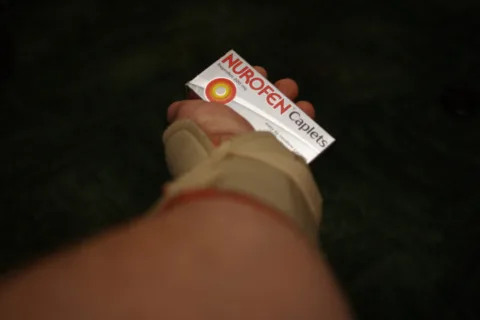If you spend a good deal of time at the computer (and you’re anything like me), then you probably think that carpal tunnel is just something you’ve got to live with. I know I did…
Until recently, when I woke up in the middle of the night begging my husband (at 3AM!) to help me decide whether ice packs or heat packs would be best for easing the incredible pain I was having in the middle of my right wrist/palm area. It just wouldn’t go away and kept alternating between a sharp pain and a throbbing ache.
I made it through the night, then after much research, I found a number of things that I could do to make my work station (at home and at work) more ergonomic, relieving the symptoms of carpal tunnel and RSI.
Here’s a Warning: I found it printed somewhere that it’s not uncommon for people to have to leave computer-dependent careers as a result, or even to be disabled and unable to perform tasks such as driving or dressing themselves. This can become a serious issue if you don’t take steps to lessen the discomfort EARLY!
Carpal Tunnel: Do You Have It?
 If you have weakness in your hand or wrist, and your hand or wrist becomes easily fatigued after a certain amount of time at the computer, then you may be experiencing early signs of RSI (the underlying problem behind carpal tunnel syndrome).
If you have weakness in your hand or wrist, and your hand or wrist becomes easily fatigued after a certain amount of time at the computer, then you may be experiencing early signs of RSI (the underlying problem behind carpal tunnel syndrome).
Rather than a “diagnosis” per se, RSI (Repetitive Strain Injury) is an umbrella term used to describe a particular form of injury — such as one caused by overuse of the nerves, muscles and tendons; the ailments include carpal tunnel syndrome, tendinitis and trigger finger, to name a few. The most affected areas are: the neck, shoulders, upper back, upper arm, elbows, forearms, wrists, thumbs and fingers.
It is believed that roughly 3-5% of the general U.S. population suffers from carpal tunnel syndrome — a medical problem of the hands where the large nerve that travels under the palm (the medial nerve) is routinely pinched, resulting in pain and fatigue.
Here’s a list of the most common conditions associated with excessive computer use, and their treatments.
Symptoms Associated With RSI And Carpal Tunnel
- Tingling, numbness, or loss of sensation in your hands, fingers, or arms
- Stiffness, clumsiness, or difficulty opening and closing hands, carrying things, or holding things
- Avoidance of activities that were once enjoyable, including a reluctance to shake hands
- Waking up with wrist pain in the middle of the night, or routinely experiencing pain and soreness during the day
The symptoms may worsen when you are doing forceful or repetitive work with your hands, like driving, gardening, cleaning, or using a computer.
If you also feel pain whenever you are reaching overhead, then chances are, you’ve got something other than carpal tunnel syndrome.
What To Watch For
Repetition of hand use is the primary factor causing carpal tunnel syndrome.
Using a mouse causes overuse of the dominant hand, as well as improper placement of your hand, wrist and arm. Keep in mind, the click is only one part of mouse use. You still have to drag, circle, and point the mouse, all of which can lead to overusing the dominant hand.
Here are some helpful books for understand RSI and carpal tunnel syndrome.
NOTE: This is Part One of a 2-part article about RSI and Carpal Tunnel Syndrome. Part Two includes what you can do to lessen the pain and make your workstation more ergonomic.





